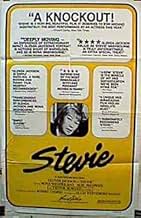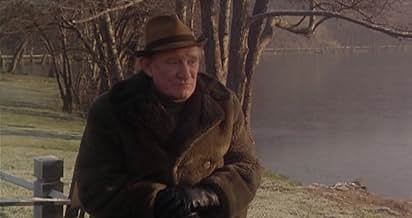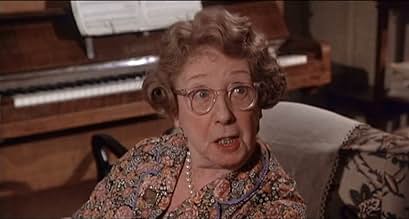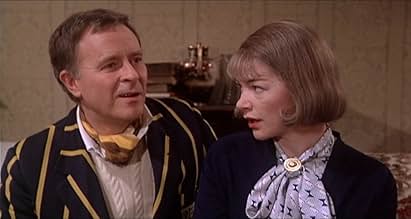Adicionar um enredo no seu idiomaThis biographical film has Glenda Jackson portraying a British poet with emotional problems.This biographical film has Glenda Jackson portraying a British poet with emotional problems.This biographical film has Glenda Jackson portraying a British poet with emotional problems.
- Indicado para 1 prêmio BAFTA
- 8 vitórias e 4 indicações no total
Enredo
Você sabia?
- CuriosidadesThe film was given a very limited release in the USA in late 1978, but only on the West Coast. Over two years later, it was shown theatrically on the East Coast and proved a big hit with critics, going on to win many awards, including 2 acting awards from the New York Film Critics.
- Citações
Stevie Smith: Agatha Christie is so deadly serious in English... but in French, she's so delightfully funny! Je m'apelle Hercule Poirot, un detective. Her murders are so polite!
Avaliação em destaque
There could never be a great film about Stevie Smith; the poet is simply too small, silly and self-absorbed, like her work - just the kind of poetry that seems to win awards, as hers did twice.
But smallness is the strength of this film, and its economy has been praised by many. Most of the action (mainly talk, in fact) takes place in one modest suburban front parlour, between Stevie and her deeply unpoetic Yorkshire aunt, played by Mona Washbourne, who comes a little too close to caricature, and does not quite measure up to Glenda Jackson, Trevor Howard or Alec McCowen, who comprise the rest of the minimal cast. Even at that, the two males are only allowed on-board as fringe-characters, McCowen as the hopeful young suitor Freddy, doomed to disappointment, and Howard as a mystery figure, known only as The Man, presumably an ex-lover, who recites a few of her poems with deep sincerity.
These poems display little virtue (rather like a poor man's Edith Sitwell), but they reveal an unusually deep preoccupation with death, alongside a confused and childish protest against middle-class values, as deeply embedded in the aunt's character. Her coining of the phrase 'Not waving but drowning' may yet survive as her epitaph.
Jackson carries full conviction as Stevie, having to act the same person from schooldays onwards, so we don't always know what age and stage we're at. She talks as though she's still in her teens when she visits Berlin with a German boyfriend at the beginning of the Nazi era, by which time Stevie would have been into her thirties.
Meanwhile she treats death as another character in the story, apparently welcoming the certainty of his arrival, and Howard reports that she died, unable to speak, but circling one word on a sheet of paper. The word was 'Death'.
But smallness is the strength of this film, and its economy has been praised by many. Most of the action (mainly talk, in fact) takes place in one modest suburban front parlour, between Stevie and her deeply unpoetic Yorkshire aunt, played by Mona Washbourne, who comes a little too close to caricature, and does not quite measure up to Glenda Jackson, Trevor Howard or Alec McCowen, who comprise the rest of the minimal cast. Even at that, the two males are only allowed on-board as fringe-characters, McCowen as the hopeful young suitor Freddy, doomed to disappointment, and Howard as a mystery figure, known only as The Man, presumably an ex-lover, who recites a few of her poems with deep sincerity.
These poems display little virtue (rather like a poor man's Edith Sitwell), but they reveal an unusually deep preoccupation with death, alongside a confused and childish protest against middle-class values, as deeply embedded in the aunt's character. Her coining of the phrase 'Not waving but drowning' may yet survive as her epitaph.
Jackson carries full conviction as Stevie, having to act the same person from schooldays onwards, so we don't always know what age and stage we're at. She talks as though she's still in her teens when she visits Berlin with a German boyfriend at the beginning of the Nazi era, by which time Stevie would have been into her thirties.
Meanwhile she treats death as another character in the story, apparently welcoming the certainty of his arrival, and Howard reports that she died, unable to speak, but circling one word on a sheet of paper. The word was 'Death'.
- Goingbegging
- 30 de mai. de 2019
- Link permanente
Principais escolhas
Faça login para avaliar e ver a lista de recomendações personalizadas
Detalhes
- Data de lançamento
- País de origem
- Idioma
- Também conhecido como
- Stevie
- Locações de filme
- Avondale Road, Londres, Inglaterra, Reino Unido(Exterior house)
- Empresas de produção
- Consulte mais créditos da empresa na IMDbPro
- Tempo de duração1 hora 42 minutos
- Mixagem de som
- Proporção
- 1.78 : 1
Contribua para esta página
Sugerir uma alteração ou adicionar conteúdo ausente

Principal brecha
By what name was O Destino de Stevie (1978) officially released in Canada in English?
Responda






















